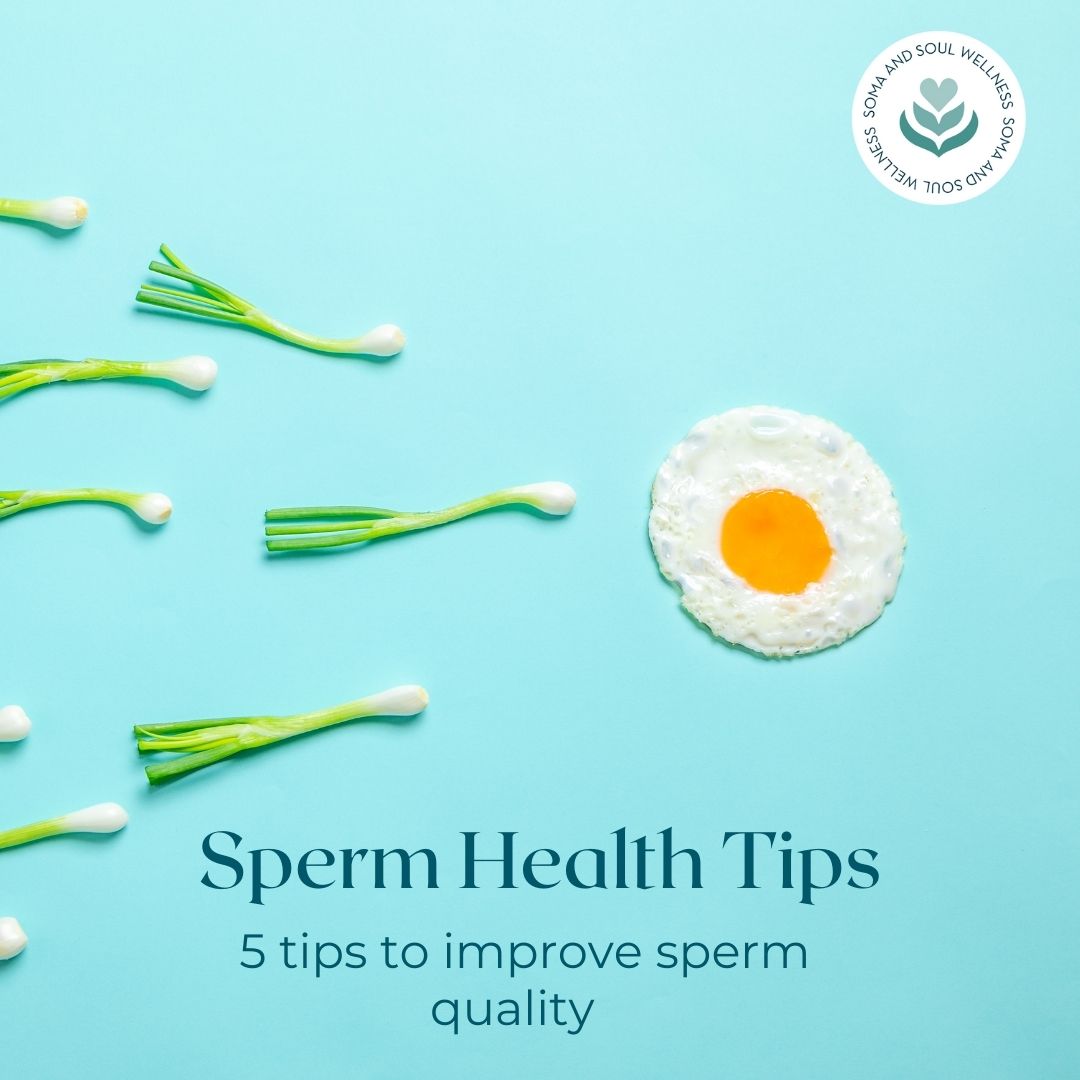Although the thought doesn’t often cross our minds, when it comes to fertility, taking care of the sperm is just as important as taking care of the womb. Within 30% of couples struggling with fertility the cause comes from the male, and in 20% the cause is a combination of factors from both the female and male. This number may be higher than you would have predicted, which is why sperm health needs to be moved up on our priority list. Here are a few things you can do to optimize sperm health when trying to conceive.
-
Reduce stress
We know it’s easier said than done but this change is so important! Stress not only has an impact on sexual function, it also impacts hormonal health and the hormones that help sperm production. When we are stress our hypothalamic-pituitary-adrenal (HPA) axis is activated, this is the connection between our brain and adrenal glands. The activation of the HPA axis directly inhibits the hypothalamic-pituitary-gonadal (HPG) axis, which is the connection between our brain and reproductive organs. In times of stress gonadotropin-inhibitory hormone (GnIH) is released, which also inhibits the HPG axis. This inhibition of the HPG axis causes testosterone levels to drop, which slows down or stops the production of sperm. A review and meta-analysis of the literature around this revealed that psychological stress can lower sperm density and motility and increase sperm with abnormal morphology. So, we know that reducing stress is important, but how do we do this? Creating time in your schedule to take care of yourself should be a priority when trying to conceive. And practices like yoga and meditation should not be underestimated!
-
Get some sleep
Piggybacking off tip one is the topic of sleep. Getting adequate sleep can be hard when we are stressed but using sleep hygiene and setting up a stable sleep routine is an important part of self-care. Sleep disturbances are associated with decreased sperm parameters, meaning they decrease the likelihood of pregnancy! Having either too much or too little sleep can impair the health of the sperm. Trying to go to bed at the same time every night and setting your alarm for the same time every morning can support a health circadian rhythm and natural production of melatonin. Melatonin is a not only the hormone that supports sleep, but it is also a reproductive antioxidant and having low melatonin is associated with infertility. If sleep is something you struggle with, an ND can support you in getting back on track and getting your full 8 hours again!
-
Cool down
The scrotum is on the outside of the body for a reason! With this position heat can easily be released to maintain a temperature that is 2-3 degrees lower than the rest of the body. Elevated scrotal temperatures can decrease sperm health significantly. It has even been shown to damage sperm enough to prevent implantation and embryo development. One of the most common culprits is the laptop, having a hot device directly on your lap for extended periods prevents the scrotum from regulating its own temperature. Other things to avoid include hot tubs and saunas, tight briefs, seat warmers, and long hot baths.
-
Smoking cessation
We all know that smoking is horrible for our lungs, but its negative impacts extend beyond that. Smoking tobacco can lead to reduced semen quality and hormone dysfunction. Because of this, smokers have a higher risk of sub-fertility or infertility. Even when IVF is used, parental smoking results in decreased pregnancy rates. In addition to this smoking tobacco can damage the DNA in sperm, creating heritable mutations that can impact the health of the baby. Specifically, parental smoking is associated with increased risk of acute lymphocytic leukemia for the child. One last thing to consider is the impact of second-hand smoke on a pregnant partner.
-
Have a mocktail!
You may have noticed all the news on Health Canada’s new recommendations for alcohol consumption. A new report recommends consuming fewer than 2 drinks per week as more than this could contribute to increased health risk. This health risk applies to fertility and hormonal health as well. Alcohol is a reproductive toxin and has the potential to interfere with sperm production. Alcohol consumption blocks GnRH secretion, thereby inhibiting the release of LH and FSH. These hormones are crucial to stimulation of sperm production. Higher amounts of alcohol consumption are associated with decreased semen parameters. With the popularity of mocktails and zero-proof drinks increasing it is easier than ever to reduce your alcohol intake!
Remember that sperm need 60-90 days to mature and travel down the reproductive tract. Because of this, the sperm in a single ejaculate can reflect the influences that occurred up to 3 months prior. Therefore, lifestyle changes and efforts to improve sperm health can take 2-3 months to take effect!
Article by Carmen Aguayo.




